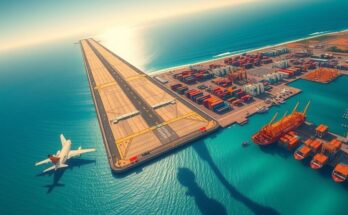Fresh fighting has erupted in eastern DRC, particularly in South Kivu province, after a call for a ceasefire by African leaders. The M23 rebel group is advancing and has seized significant control in the area, worsening the humanitarian crisis. International calls for a resolution have intensified amid fears of regional conflict, but diplomatic efforts remain largely unsuccessful.
On Tuesday, fresh hostilities erupted in eastern Democratic Republic of Congo (DRC) just three days after African leaders called for a ceasefire. M23 rebel fighters launched an assault on Congolese army positions in South Kivu province early in the morning, as confirmed by local and security sources. The DRC government has classified the M23 group as a terrorist organization, which the United Nations and the United States categorize as an armed rebel faction. The DRC accuses Rwanda of backing these rebels, a claim Rwanda vehemently denies.
This resurgence of conflict follows a plea from leaders in east and southern Africa for military planners to present a strategy for an “unconditional” ceasefire. The ongoing conflict has resulted in numerous fatalities and displaced many individuals from their homes. In recent months, the M23 has rapidly occupied regions in the mineral-rich eastern DRC, reigniting its rebellion in late 2021, amidst a nation that has faced endless strife for decades.
The M23 commenced its offensive in South Kivu after seizing Goma, the capital of the neighboring North Kivu province, at the end of the previous month. Clashes were reported near the village of Ihusi, located approximately 70 kilometers from provincial capital Bukavu and 40 kilometers from the nearby airport, with local sources indicating heavy weapon usage.
Kavumu airport serves as a strategic location for transferring Congolese military reinforcements and is positioned close to the primary military base. With the potential threat of an M23 offensive in Bukavu, residents have taken precautions, resulting in school closures and a hurried evacuation as shops remained closed due to increased fears of attack. The capture of Bukavu would grant the M23 and Rwandan forces full control over Lake Kivu.
Approximately 300 Congolese soldiers are currently facing military court charges for crimes that include rape, murder, and looting. The M23, asserting a desire to “liberate all of Congo” and oust President Felix Tshisekedi, has attempted to penetrate the highlands overlooking the main supply route to Bukavu, though Burundian soldiers, present to assist the Congolese army, have been successful in halting their advances. There are around 10,000 Burundian troops deployed in South Kivu, with a recent battalion dispatched to bolster efforts in the area.
In Goma, the M23 has initiated the establishment of its own governance, including police recruitment campaigns, amidst worsening humanitarian conditions. Many residents lack access to clean water, relying on Lake Kivu, which poses health risks due to the retrieval of bodies related to the skirmishes. The humanitarian crisis has been exacerbated by a rise in cholera cases primarily affecting displaced persons, as reported by the UN’s humanitarian agency OCHA.
Humanitarian efforts are further hindered as Goma’s airport remains closed despite UN requests for transporting aid. The ongoing crisis in eastern DRC is slated for discussion at an African Union meeting in Addis Ababa, Ethiopia. With the escalating hostilities, international calls for de-escalation have grown amid concerns that the conflict could escalate into a regional war. However, diplomatic attempts to navigate a resolution to this prolonged turmoil have been largely ineffective.
The DRC has also sought “targeted sanctions” against Rwanda, yielding minimal results. Kinshasa has accused Kigali of attempting to exploit the DRC’s vast natural resources, including tantalum, tin for electronics, and gold, a charge Rwanda contests by asserting their need to eliminate groups threatening their security, especially the Democratic Forces for the Liberation of Rwanda (FDLR), founded by those responsible for the 1994 Rwandan genocide.
Compounding the DRC’s challenges, a militia from the Lendu ethnic group in the northeastern Ituri province recently attacked and killed 51 individuals, most of whom were displaced persons, according to local and humanitarian sources. Members of the Cooperative for the Development of Congo (CODECO), which transitioned from an agricultural cooperative to a militant group, allegedly perpetrated the massacre as a retaliation against a Hema militia assault in adjacent regions. The DRC has faced relentless conflicts and rebellions for over three decades.
Fighting has reignited in eastern DRC, underscoring the failure of ceasefire initiatives and revealing the ongoing humanitarian crisis. The controversial M23 rebel group, accused of receiving support from Rwanda, has continued its territorial advances amidst escalating violence. Regional leaders are convening to discuss the situation, yet historical conflicts and repeated diplomatic failures raise concerns over the DRC’s stability and security. The humanitarian conditions have worsened significantly, complicating efforts for relief and peace.
Original Source: www.voanews.com




